Introduction
Best Dog Food for Puppies Small Breed Nutrition Guide
Choosing the best dog food for puppies, especially for small breeds, is crucial for their growth and development. Small breed puppies have unique nutritional needs due to their faster metabolisms and smaller stomachs. This guide will help you navigate the world of puppy food, ensuring your furry friend gets the right balance of nutrients to thrive.
Why Small Breed Puppies Need Specialized Food
With great differences in physiologies and growth patterns with larger breeds, small breed puppies, such as Chihuahuas, Pomeranians, and even Yorkshire Terriers, have disparate nutritional needs than their larger siblings. Herein lies a discussion of why it is important that they get very specific food when they are still puppies:
1. Higher Metabolism
Small breed puppies have a really fast metabolism when compared to puppies of larger breeds. What this really means is they burn off calories at a super fast rate; hence, needing energy-dense food to complement the high amount of energy contained within them. For instance, a Chihuahua can need nearly a double amount of calories compared with a large breed, such as a Labrador Retriever, per pound body weight.
Small breed puppy food is specifically prepared with higher content of calories and nutrient density on this behalf. Without this, small breed puppies can have crashes in energy, become lethargic, or even suffer from developmental problems.
2. Smaller Mouths and Teeth
Puppies of small breeds have very small mouths and teeth; hence, chewing bigger kibbles may be challenging and even dangerous for them. Not only are the kibbles smaller in size for small breeds, but often the texture is softer to make it easy for them to chew and digest. For instance, a Yorkie’s small jaw might struggle with the large kibble meant for a German Shepherd, leading to improper chewing and potential choking hazards.
Specialized kibble ensures that small breed puppies can eat comfortably and safely, promoting better digestion and nutrient absorption.
3. Rapid Growth and Development
Small breed puppies grow at an accelerated rate compared to larger breeds. Where a Great Dane might take 18-24 months to reach complete maturity, a Pomeranian could be completely grown in 9-12 months. Such rapid growth entails that their bodies need a correct balance of nutrients, including higher levels of protein, fat, and essential vitamins and minerals for healthy development. For example, calcium and phosphorus must be in the proper balance to maintain good bone development without overworking their tiny frames.
Specialized small breed puppy food is prepared to provide for these nutrients in the right balance to help the puppy avoid situations such as brittle bones or other joint problems that may arise when they get older.
4. Higher Risk of Hypoglycemia
Hypoglycemia, or low blood sugar, can easily occur in small breed puppies due to their high metabolism and small size. This can be life-threatening if not properly addressed. Foods specifically formulated for small breeds include easily digestible carbohydrates and often come with recommendations for frequent feeding to maintain stable blood sugar levels.
Such a recommendation might be that a Maltese puppy should eat smaller, more frequent meals throughout the day so that sudden drops in energy do not occur.
5. Dental Health Considerations
Small breeds are also more prone to dental problems, such as plaque and tooth decay, due to their overcrowded teeth. Many foods for small breed puppies contain special ingredients or kibble shapes to help promote dental health by helping to reduce tartar buildup. Some kibble is textured so that when a puppy chews, the design helps clean his teeth, working much like a mini toothbrush with every single bite.
6. Personalized Nutrition Profiles
Small breed puppies have specific nutrient requirements different from larger breeds. For example, there are greater needs for omega-3 and omega-6 fatty acids, which are required for brain development, among other things, and to ensure a healthy coat. Added to many small breed formulas are antioxidants like vitamin E and beta-carotene, which may help fortify the immune system of smaller breeds, generally more sensitive than larger breeds.
7. Portion Control and Overfeeding Risks
Because of their small size, it’s easy to overfeed small breed puppies, even on accident, which can lead to obesity and other health issues. Many foods for small breed puppies have very specific feeding instructions based on their size and activity level. For instance, a Shih Tzu puppy may only need a quarter cup of food per meal, while a larger breed puppy may need a full cup or more.
Key Nutritional Requirements for Small Breed Puppies
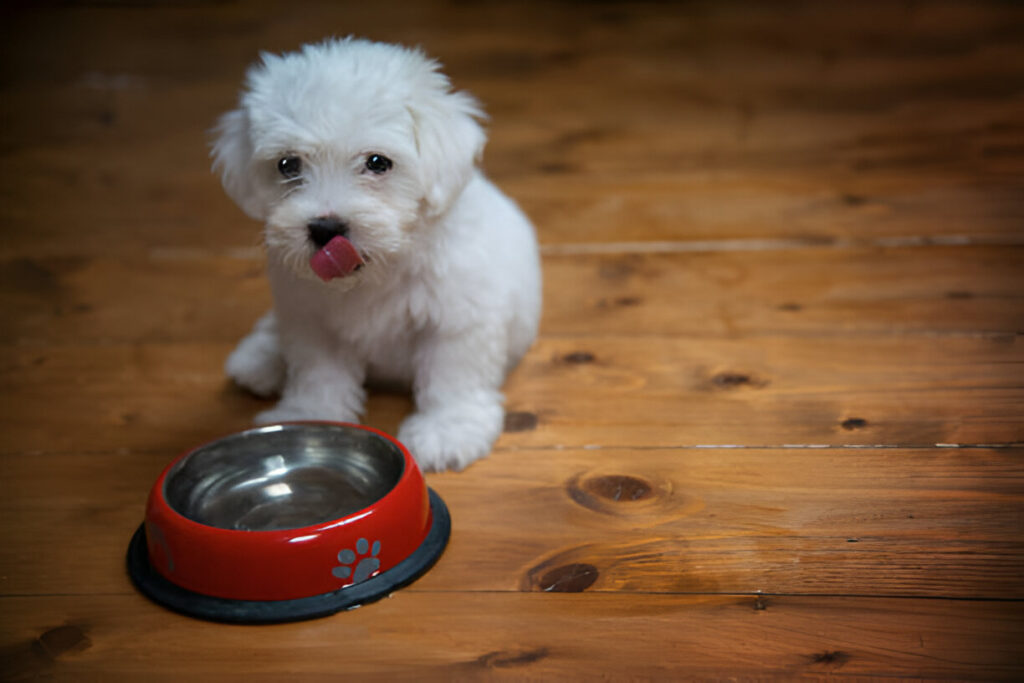
Proper food selection for the small breed puppy is very vital in making healthy and energetic adults. Due to fast metabolisms, smaller stomachs, and quicker growth rates, small breed puppies have somewhat different nutritional needs. The diet they eat must be balanced, using only the best ingredients that can provide all nutrients necessary for such a remarkable growth period. For an in-depth discussion on the most important nutrient needs, see below for small breed puppies:
High-Quality Protein
Protein is a building block in your puppy’s nutrition, fundamental in the building and repair of body tissues such as muscles, thus very vital in the overall development of a puppy. Since small breed puppies have a higher growth rate, their protein needs are higher than larger breeds. A minimum of 22% protein in the dog food with high-quality animal-based sources of protein is required, which should be anchored in chicken, turkey, lamb, or fish. Avoid foods with ambiguous protein sources, such as “meat by-products,” as these will not provide the same nutritional value.
Examples of High-Quality Protein Sources:
- Deboned chicken
- Salmon
- Turkey meal
- Eggs
Healthy Fats
Fats provide a lot of energy and thus are very important for small breeds of puppies, who have very fast metabolic rates with their leading high expenditure of energy. Healthy fats such as omega-3 and omega-6 fatty acids aid in brain development and giving the fur a shine to the coat by keeping the skin healthy. Such food needs a source like fish oil, flaxseed, and chicken fat for them to be given.
Health Benefits of Fats:
- Support cognitive function and brain development
- Improve skin and coat health
- Energy play and growth
Sources of Healthy Fats: - Fish oil rich in omega-3s
- Flaxseed a plant-based source of omega-3s
- Chicken fat a balanced source of omega-6s
Digestible Carbohydrates
Carbohydrates are a vital source of energy for active puppies, but they need to be easily digestible to avoid causing an upset stomach. Sweet potatoes, brown rice, oats, and peas are whole, nutrient-rich carbs that will provide them with sustained energy without spiking blood sugar levels, which is very important for small breeds that can suffer from hypoglycemia.
Why Digestible Carbs Matter:
- Provide sustained energy for playing and growth.
- Support digestive health with fiber
- Help maintain a healthy weight
Examples of Digestible Carbohydrates:
- Sweet potatoes
- Brown rice
- Oats
- Pumpkin
Vitamins and Minerals
Vitamins and minerals are necessary for the general health of the puppy, particularly in the development of bones and teeth. Small breed puppies do need enough amounts of calcium, phosphorus, and vitamin D so that bones can become hard and dense. Deficiency may lead to problems in development, such as weak bones or joint problems.
Key Vitamins and Minerals for Puppies:
- Calcium and Phosphorus: Both are used in the development of bones and teeth.
- Vitamin D: Helps in the assimilation of calcium and phosphorus in the system.
- Vitamin E: Antioxidant helpful for the immune system.
- Zinc: Important for skin and coat health.
Sources of Essential Vitamins and Minerals:
Calcium: The sources are dairy products, bone meal, leafy greens.
Phosphorus: Sources are meat, fish, and eggs.
- Vitamin D: Fish oil and egg yolks
DHA (Docosahexaenoic Acid)
DHA is an omega-3 fatty acid that is very important for brain and vision development. For puppies, whose brains are growing very fast in the first months of life, this is an especially important ingredient. Many premium puppy formulas include DHA, usually sourced from fish oil or algae.
Benefits of DHA:
- Enhances cognitive function and learning ability
- Supports healthy vision development
- Promotes better trainability and behavior
Sources of DHA:
- Fish oil (e.g., salmon oil)
- Algae-based supplements
- Eggs enriched with omega-3s
Additional Considerations for Small Breed Puppies
- Calorie-Dense Foods: Small breeds have small tummies yet huge energy requirements; hence, finding a very calorie-dense food is paramount. This will help them derive as much energy as possible from small portions.
- Kibble Size: Go for only small-sized, bite-sized kibble meant for small breeds, making eating easier and safer.
- More Frequent Feedings: A small breed puppy may need 3-4 small meals every day to be able to avoid dropping in sugar levels and hence losing energy.
Top Picks: Best Dog Food for Small Breed Puppies
Food plays a very important role in the upbringing of a small breed puppy, especially in nutrition. The reason being, all small breed puppies have different nutritional needs compared to other puppies, which may be because their metabolisms run quicker, they can have smaller stomachs, and they require much more energy. Because of these special needs, choosing the right dog food is important to give your furry friend the best start in life.
Here are some of the best options, tailored for small breed puppies, along with extra information to help you make an informed decision:
1. Royal Canin Small Breed Puppy Dry Food
- Why It’s Great for Small Breeds: This formula is very carefully created to meet the nutritional needs of small breed puppies, which often need more calories per pound than larger breeds.
- Key Features:
- It contains a blend of antioxidants-like vitamins E and C and prebiotics to support a robust immune system and promote healthy digestion.
- The kibble size is especially designed for small jaws, hence easy to chew and digest for small puppies.
- Enriched with essential nutrition such as DHA and EPA for the appropriate development of the brain, plus great supplemented cognitive function.
- Ideal For: Breeds include Chihuahuas, Pomeranians, Shih Tzus, and Yorkshire Terriers.
- Additional Tip: For some small breeds, Royal Canin has breed-specific formulas you could use to better tailor the diet to the needs of your puppy.
2. Hill’s Science Diet Puppy Small Bites
• Why It’s Great for Small Breeds: Perfect nutrient content as tiny dogs’ fast growth pressures fall on varied levels along with extreme energy reserves.
• Key Features:
- Real chicken meal as the first protein source, so that your puppy has the right amounts of amino acids for proper growth and development of muscles. It contains DHA from fish oil, which, during the young years of existence, is much needed in order to develop eyes and a brain.
- The kibble size is very small and, therefore, best suited for small mouths, and the texture will help promote chewing. – Free from artificial colors, flavors, and preservatives; hence, all-natural and wholesome. – Ideal For: Small breeds such as Maltese, Miniature Dachshunds, and Toy Poodles.
- Additional Tip: Hill’s Science Diet also comes in a wet food variety, which can be combined with kibble for an added level of excitement and moisture.
3. Blue Buffalo Life Protection Small Breed Puppy
- Why It’s Great for Small Breeds: Blue Buffalo has a great line of products based on high-quality, natural ingredients, and this formula is no exception.
- Key Features:
• Real meat like chicken or lamb is always the first ingredient and provides a superior source of protein for lean muscle development.
• LifeSource Bits proprietary blend of antioxidants, vitamins, and minerals for immune health and overall vitality. - Free from common allergens like corn, wheat, and soy, which makes it a great option for puppies with sensitive stomachs.
- Includes omega-3 and omega-6 fatty acids to promote a healthy coat and skin.
- Ideal For: Small breeds include Boston Terriers, Cavalier King Charles Spaniels, and Miniature Schnauzers.
- Added Bonus: Blue Buffalo has a grain-free Wilderness line for puppies with higher protein for more active little dogs.
4. Wellness Complete Health Small Breed Puppy
- Why It’s Great for Small Breeds: Wellness offers holistic nutrition so your puppy receives a proper, well-rounded diet using high-quality ingredients.
- Key Features:
In this formula, the first ingredient is deboned chicken with a staple blend of grains such as oatmeal for sustained energy. Additional salmon oil acts to provide natural sources of DHA and EPA for brain development and functioning. - Antioxidant-packed, such as blueberries and spinach, combined with probiotics to boost the immune system and promote a healthy digestive system.
- Formulated for healthy skin and a shiny coat, thanks to ingredients like flaxseed and vitamin E.
- Ideal For: Small breeds like French Bulldogs, Havanese, and Papillons.
- Additional Tip: Wellness also has a grain-free version for puppies with grain sensitivities or allergies.
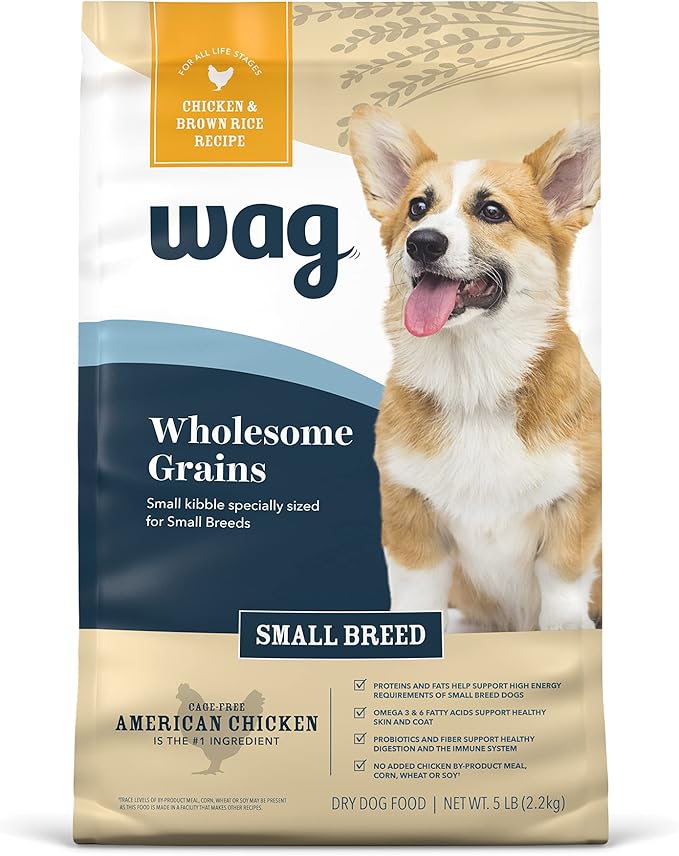
Amazon Brand – Wag Small Breed Dry Dog Food, Chicken and Brown Rice, 5 lb Bag
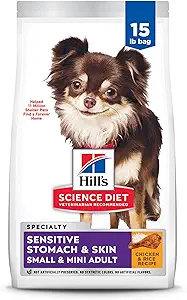
Hill’s Science Diet Sensitive Stomach & Skin, Adult 1-6, Small & Mini Breeds Stomach & Skin Sensitivity Support, Dry Dog Food, Chicken Recipe, 15 lb Bag
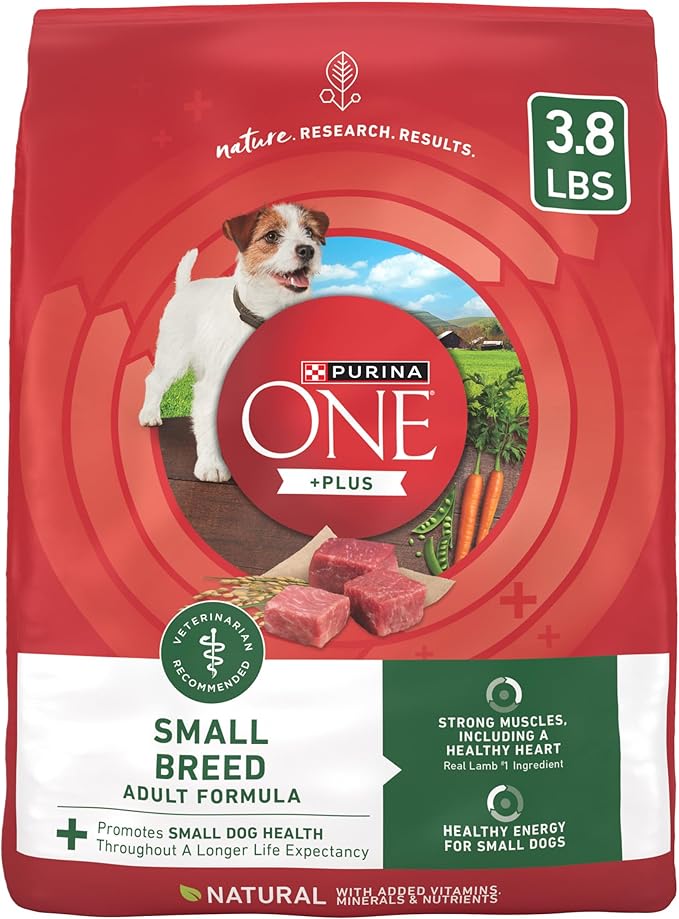
Purina ONE Plus Small Breed Lamb and Rice Formula Dry Dog Food – 3.8 lb. Bag
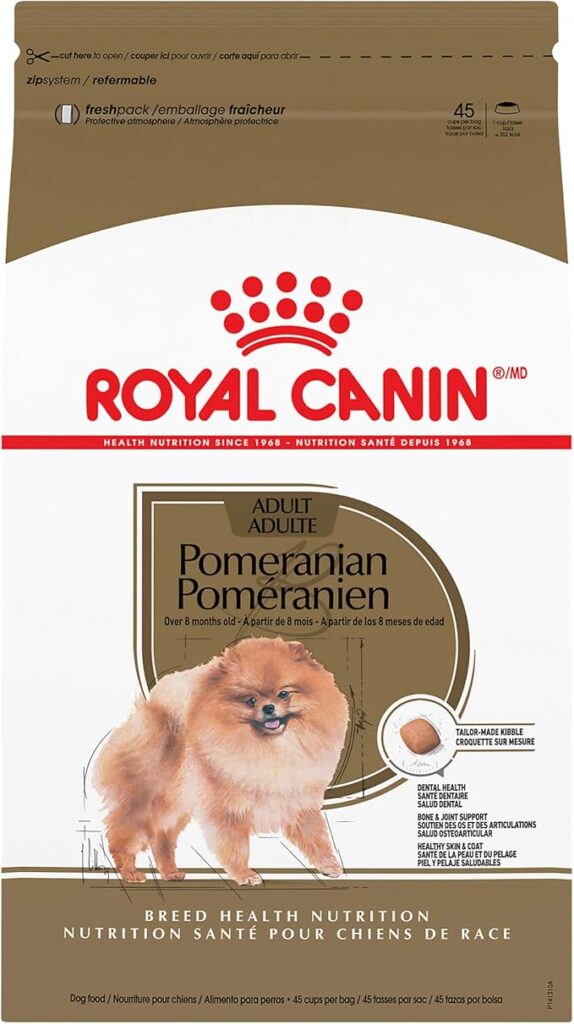
Royal Canin Breed Health Nutrition Pomeranian Dry Dog Food, 2.5 lb bag
Additional Considerations When Choosing Small Breed Puppy Food
- Caloric Density: Small breed puppies burn energy quickly, so look for calorie-dense formulas to meet their high energy needs.
- Kibble Size: Smaller kibble is easier for tiny mouths to chew and reduces the risk of choking.
- Protein and Fat Content: The formula should contain a minimum of 25% protein and 15% fat for growth and development.
- Avoid Fillers: Also, try to avoid foods with a lot of fillers such as corn, soy, and by-products that have little nutritional value.
- Consult Your Vet: Always consult your veterinarian to make sure the food you choose aligns with your puppy’s specific health needs.
How to Choose the Best Dog Food for Your Puppy
Picking up the perfect puppy food involves much more attention than one could read from the packaging. Here is a guide to help you make a better decision:
- Age and Weight
Choose puppy-specific formulas that correspond to your dog’s age and weight. Puppies have different nutritional needs than adult dogs; so, find food that supports their growth and overall development. - Ingredients List
Look for kibble with whole, high-quality proteins like chicken, beef, or lamb as the first ingredient. Avoid formulas containing fillers such as corn and soy, along with artificial additives that do little in the way of nutrition. - Kibble Size
Smaller breeds need smaller-sized kibble, which can help prevent the risk of choking and ease digestion. Larger breeds may need bigger kibble, but these should be in proportion to the size of the puppy. - Brand reputation: Stick to well-known brands that have earned a good reputation with regard to the nutritional value and safety of the kibble. Major good brands include Royal Canin, Hill’s Science Diet, and Blue Buffalo, well recognized for excellence in animal nutrition.
- Veterinary Recommendations
Your veterinarian will give you specific recommendations concerning special needs in your puppy’s health, his breed, and possible allergy factors. Always consult them before making any final decisions.
By paying attention to these factors, your puppy will be assured of receiving all the nutrients that he needs to grow into a healthy and happy dog.
Common Mistakes to Avoid
- Overfeeding: Small breeds have a tendency to be overweight. Follow the portion guidelines on the packaging.
- Allergies Being Ignored: Watch for signs of food allergies, such as itching or digestive issues.
- Changing Food Too Fast: Gradually transition to new food over 7–10 days to avoid stomach upset.
Feeding Tips for Small Breed Puppies
- Frequent Meals: Feed 3–4 small meals daily to maintain energy levels.
- Hydration: Always provide fresh water alongside meals.
- Treats in Moderation: Use healthy, puppy-specific treats for training.
Conclusion
Choosing the best dog food for puppies of small breeds is a critical step in ensuring their health and happiness. By focusing on high-quality ingredients, proper portion sizes, and specialized formulas, you can set your puppy up for a lifetime of well-being.
Have you found the perfect food for your small breed puppy? Share your experiences in the comments below or explore our related articles on puppy care tips!
Yuns Legdm is a passionate advocate for pet care and the founder of this website, dedicated to providing valuable information for fellow pet lovers and veterinary professionals worldwide. With a deep love for animals, Yuns created this platform to connect passionate pet owners with expert insights from veterinarians around the globe.
This website grows with you—the passionate pet owners and veterinary experts—creating a trusted space where knowledge, experience, and love for animals come together. Whether you’re seeking advice on pet health, nutrition, or general well-being, this platform is here to support you on your journey of responsible and loving pet care.





